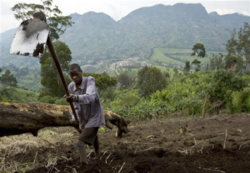
Agribusiness companies express concern over an article that says farms must be owned by "a person of Congolese nationality or a Congolese legal entity whose shares, if applicable, are majority-owned by the Congolese state or by nationals".
Land-grab fears take hold in Congo
Prospect of Mugabe-style seizure of foreign-owned assets looks increasingly likely in country where two thirds live in poverty
Jonny Hogg
A LAW meant to breathe new life into agriculture in Democratic Republic of Congo risks scaring off needed foreign investment due to a clause calling for farms to be majority-owned by Congolese, according to investors and other sector players. The Congolese Federation of Enterprises has written a letter to the government calling the law, which is set to go into effect in June, "discriminatory" and a "catastrophe" and appealing for it to be amended.
"Everyone says to themselves, today they start with semi-nationalisation, and then one day we’ll move to total nationalisation," said Paulin Mbandala, a Congolese lawyer specialising in agriculture.
"Look at Zimbabwe, that’s the problem," he said, referring to Zimbabwe President Robert Mugabe’s seizure of white-owned farms from 2000.
The Congolese law, passed in December shortly after a chaotic presidential poll, aims to use tax breaks and other incentives to boost agricultural output in a country with enough cultivable land to cover Germany twice.
Only 10% of the land is in use and the country has been a net food importer since the 1960s due to decades of neglect, conflict and corruption. Farmers and activists had been pushing for years for the government to pass the agricultural law to revive the sector.
Since the law’s passage, however, agribusiness companies have expressed concern over an article that says farms must be owned by "a person of Congolese nationality or a Congolese legal entity whose shares, if applicable, are majority-owned by the Congolese state or by nationals".
The risk is that the law could deepen Congo’s investment woes, already suffering a setback from a drawn-out mining contract review that ended in 2010.
Several of Congo’s existing agricultural investors, including a unit of Canada’s Feronia, said the law has created uncertainty over their projects and would likely stifle new investment.
New investments are unlikely if the law is not amended, says Agnes Kasongo, MD of PHC, an oil palm operation majority-owned by Feronia. The company produced more than 6500 tons of palm oil last year and had plans to double the amount of land it cultivates.
"I don’t think that Feronia will invest further if the law is not amended," Ms Kasongo says in her office in Kinshasa’s dilapidated port area, where farmed produce used to arrive by river from the interior of the country before several wars during the 1990s and corruption saw the sector collapse.
"I don’t understand the law (article 16). The Congolese do not have money to acquire the land."
Officials from several other companies have said they would reconsider their investment plans, but asked not to be identified for fear of running into problems with the government. A western diplomat, who also asked not to be named, says three potential investors have abandoned investment plans since the law was passed.
Congo’s government has defended the law — which offers tax breaks and preferential rates on water and electricity for agricultural enterprises — as broadly positive for the sector, but admits the article 16 clause on ownership could pose problems for foreign investors.
"Congo could feed the whole of Africa, that’s certain, but we must have investment", says Marcel Kapambwe Nyombo, an agricultural ministry adviser. "(Article 16) poses a problem. Among new investors there is a certain reticence."
About a third of the country’s food was imported in 2010 from as far away as Brazil, and more than two-thirds of the country’s 70-million inhabitants are living in poverty, the World Bank says.
A letter written by President Joseph Kabila last August shows that the president himself backs the rules limiting foreign ownership, arguing it is necessary to protect the sovereignty of Congolese land.
"I ask that the imperative is made clear, that nationals control the shareholdings of Congolese-registered businesses eligible to be attributed land in Democratic Republic of Congo," it reads.
In one of the biggest deals in Congo’s agriculture sector, China’s ZTE won rights in 2008 to farm 100000ha of land in Equateur province. But the three-year deal was not renewed last year as nothing had been done to launch the project, agriculture adviser Mr Kapambwe says. ZTE now holds just 600ha of land. The firm did not respond to requests for comment.
Singapore commodities giant Olam is also negotiating with the government over possible farming ventures. The company declined to comment on the law.













